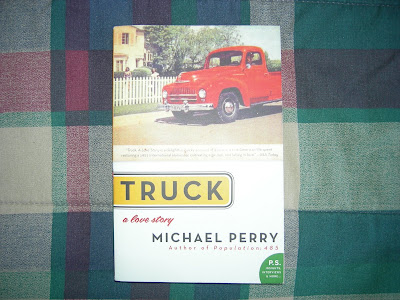The Bookworm: Truck: A Love Story

Truck: A Love Story by Michael Perry. 320 pages. Harper Perennial. 2006.
In 1951, a man bought a pickup truck because he needed to load things up and move them. Things like bricks and bags of feed. Somewhere along the line trendsetters and marketers got involved, and now we buy pickups — big, horse-powered, overbuilt, wide-assed, comfortable pickups — so that we may stick our key in the ignition of an icon, fire up an image, and drive off in a cloud of connotations. I have no room to talk. I long to get my International running in part so I can drive down roads that no longer exist.
If you saw Michael Perry walking down the street you might make the wrong assumption. Steel toed boots, lazy eye, and “Red Green” flannel shirt. You’d think he was a hick, and for the most part you’re right. Perry lives in rural Wisconsin, does a lot of shopping at Farm & Fleet, and puts everything else in his life on hold each November for deer hunting week. But he’s one hell of a journalist and essayist. He’s one of my favorite writers. I first read him three years ago when I was in Santa Cruz. An online reviewer wrote about Perry’s Off Main Street, “This guy could make dirt interesting.” When I read that I knew I had read him for myself. I bought Off Main Street and then read Perry’s first collection, Population: 485.
I’ve wanted to read Truck since it came out three years ago, and only recently bought it from Prairie Lights online. (Support your locally owned, independent bookstore, even if it’s 2,000 miles away!) I try my best to stay current.
As the title suggests, Truck is a love story. In fact, it’s three love stories. The book outlines a year spent restoring an old pickup, nurturing a garden, and falling in love.
Though Perry doesn’t have a green thumb, he’s not incompetent in the area of backyard agriculture. But his garden takes a backseat to his busy book tour and reading schedule, and also to the two other storylines. The garden aspect plays a prominent role in the beginning of the book before being bumped to the rear by Perry’s romantic endeavors. Of course, there’s really not much he could have written after nursing a few seeds in his basement before winter is done and planting the rest in raised beds during the spring. All he could do was mention the progress and bounty (or lack of), which he did.
The truck and “love” love stories dominate, and the restoration of Perry’s 1951 International Harvester L-120 is the bulk of the book. After driving it throughout his 20s and into his 30s, the truck sat unmoved in Perry’s driveway for years, slowly deteriorating. Perry longed to get it fixed up and running in time to use it for deer hunting season, but never got around to it until 2003, the year the book is based. With the help of his brother-in-law, the rusting hulk is transformed, though not in time for deer hunting.
True to Perry’s thoroughness as a journalist, he goes in-depth and includes interesting, well-crafted, and well-researched background information on everything from the classic I-H logo of International Harvester to the hairstyles he’s sported through the years (Perry doesn’t have much of a hairstyle anymore, if you catch my drift). Obviously you can’t write an entire book about fixing up a truck and falling in love (or maybe…) so the background information fills out the book nicely, complimenting the refurbishing and match making. In the business we call this a balance of scene and summary.
New word I learned: sequelae. This part is always an afterthought, which it shouldn’t be. In each book I read I come across words I don’t know or am fuzzy on their precise meaning, but I almost never stop to consult a dictionary or thesaurus. I keep reading; I’m lazy and don’t want to move from my comfortable spot. Bad writer. Baaaaad! I should not only jump at each opportunity to learn a new word, but also at the chance to explain it to the blog reading masses. However, while writing these Bookworm posts I flip through each book in search for words I’m unfamiliar with, and usually find it impossible to relocate “the p-word I read a couple days ago.” I should really circle the words I don’t know, then go back and look up their meaning when I’ve finished. Sounds like a plan, but for now I’ll have to work with “sequelae,” which I found in one of the last chapters of Truck. “Sequelae” is the plural form of “sequela,” which, according to my iMac dictionary, means “a condition that is the consequence of a previous disease or injury: the long-term sequelae of infection.” Good word.

Comments
Post a Comment